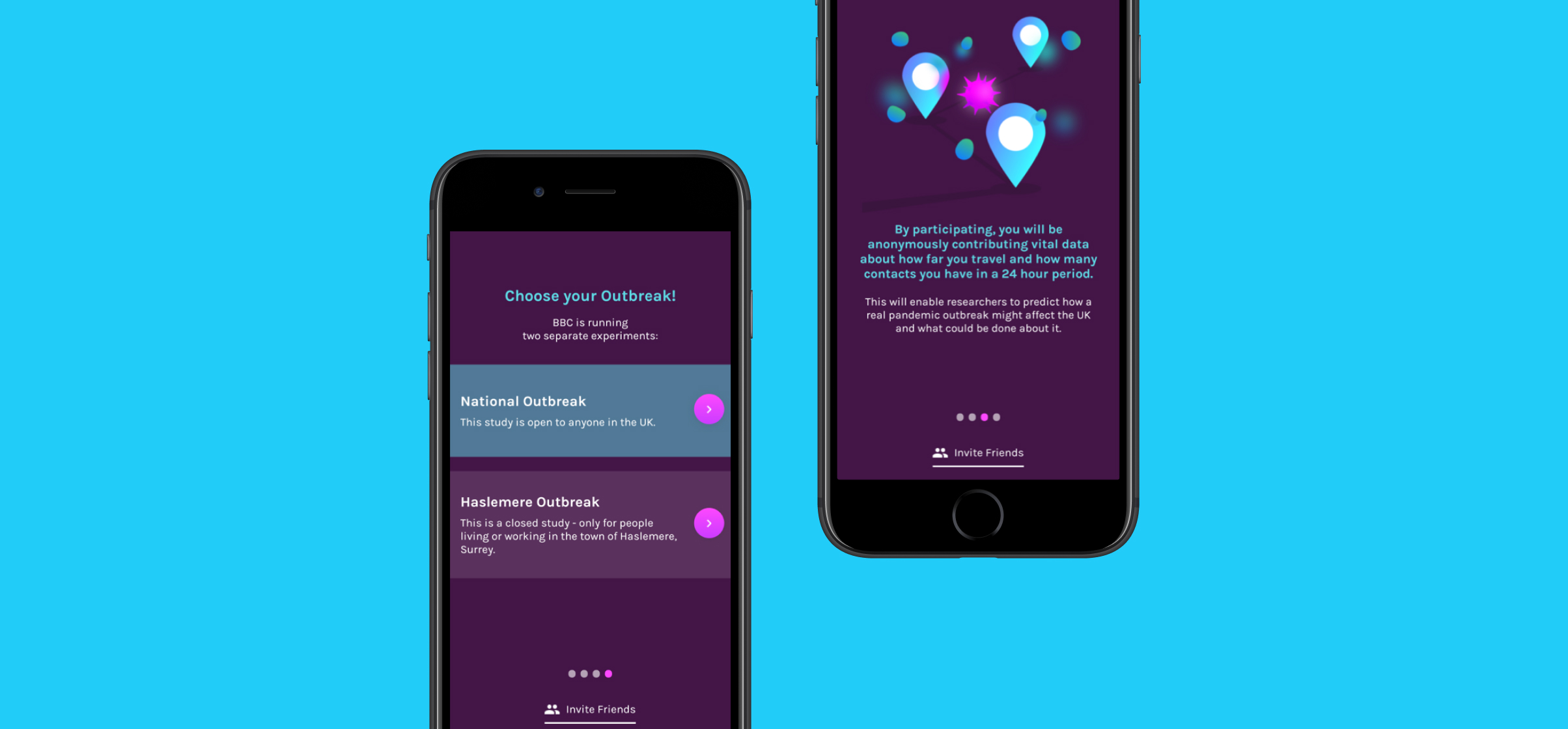BBC Pandemic App
Simulate potential virus outbreaks to save lives

What We Did
- Tehnical Product Discovery
- Prototype
- Mobile app
INDUSTRY
Health
TEAM SIZE
6 People
LOCATION
United Kingdom
Brief
Northern Irish agency Big Motive partnered with Q to build an app that would simulate and predict future pandemic spread. It was a ground-breaking nationwide citizen experiment that gathers data to help researchers predict the potential spread of a deadly flu outbreak across the UK.
Approach
By building a mobile app that would accurately simulate the spread of the potential pandemic people in the UK. Over 100 000 people anonymously contribute vital data through this science experiment through a questionnaire and helped simulate the spread of a deadly flu outbreak.
IMPACT
100 000 people were involved in the experiment, featured on the BBC TV program “Contagion!”
NORTH STAR METRIC
Number 1 Medical APP in the UK (Google Play Store, App Store)

What We Built
In December 2019, the world was faced with a spreading new disease, COVID19, that became a pandemic and a major global threat.
The UK government quickly took action and together with the BBC conducted a groundbreaking, ambitious science experiment with its citizens. Information and data are powerful and present important weapons for fighting an infectious deadly outbreak.
The government relies on computer models to predict how the disease might spread through homes, communities and cities.
By inviting the people to participate in this nationwide experiment, with the BBC Pandemic app, they could improve the understanding and quality of data that could potentially provide scientific models to fight back against the virus.
DELIVERABLES
- Mobile App that simulates flu outbreak

1
It’s Important to Take Part
Throughout medical history, there were constant flu outbreaks. The catastrophic flu, COVID 19 brings the whole world to its knees in 2021. Scientists in the UK believed that the key to the Government’s response plan are mathematical models which simulate how a highly contagious disease may spread. But the models are only as good as the data that goes into them.
Q partnered up with Big Motive, a Belfast design, and innovation studio to create a unique mobile app for this major science experiment. It was important to enroll at least 10 000 people that would submit their answers and data through the app for the success of this experiment.
While Big Motive was providing the design and research, Q built a prototype that could periodically assess and collect information from mobile devices to verify the location of users.
It was important to note to the users that all the information is voluntary and held securely in accordance with relevant data protection laws. Participation in the study is completely anonymous.

2
Features and Development
(Setting the Rules)
How to enrol citizens in an experiment that delivers data?
By building a solution that could accurately simulate the spread of the pandemic. The system was designed to completely anonymize data, excluding any identifying information. It’s important that users understand what are they agreeing to create trust that would encourage them to take part.
The mobile app asks a series of questions and requires permission to use GPS data to map out the movement to the nearest km2 over a 24 hour period. It will then request a short set of queries about users’ journeys and social interactions during the day.
The app uses strict policy procedures and security features to prevent unauthorized access or misuse of any personal information.

3
Information is Power
Using mobile technology to collect information on human movements and social mixing patterns is something that has never been done before.
Over 100 000 people took part in this experiment and helped create a new gold dataset standard for the future. BBC and Q took a huge leap forward in obtaining and processing information and data that could potentially save millions of lives.
BBC Pandemic mobile app could be a key factor in preparing for the next pandemic outbreak by identifying the human networks and behaviors that potentially spread the virus. The application will then help make more accurate predictions and models for outbreak control in the future.
